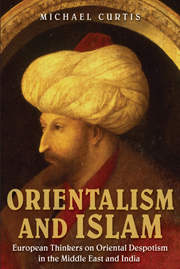Book contents
- Frontmatter
- Contents
- Acknowledgments
- Introduction: What's Past Is Prologue
- 1 European Views of Islam and Their Correlation with Oriental Despotism
- 2 Observant Travelers
- 3 Political Thinkers and the Orient
- 4 The Oriental Despotic Universe of Montesquieu
- 5 Edmund Burke and Despotism in India
- 6 Alexis de Tocqueville and Colonization
- 7 James Mill and John Stuart Mill: Despotism in India
- 8 Karl Marx: The Asiatic Mode of Production and Oriental Despotism
- 9 Max Weber: Patrimonialism as a Political Type
- 10 Conclusion
- Notes
- Select Bibliography
- Index
6 - Alexis de Tocqueville and Colonization
Published online by Cambridge University Press: 05 June 2012
- Frontmatter
- Contents
- Acknowledgments
- Introduction: What's Past Is Prologue
- 1 European Views of Islam and Their Correlation with Oriental Despotism
- 2 Observant Travelers
- 3 Political Thinkers and the Orient
- 4 The Oriental Despotic Universe of Montesquieu
- 5 Edmund Burke and Despotism in India
- 6 Alexis de Tocqueville and Colonization
- 7 James Mill and John Stuart Mill: Despotism in India
- 8 Karl Marx: The Asiatic Mode of Production and Oriental Despotism
- 9 Max Weber: Patrimonialism as a Political Type
- 10 Conclusion
- Notes
- Select Bibliography
- Index
Summary
The stature of Alexis de Tocqueville (1805–59) as a political thinker has varied during the last century and a half. The rapid acknowledgment of the importance of his writings immediately on their publication, and the warmth and extent of his voluminous correspondence with both French and foreign, especially British, distinguished individuals, including John Stuart Mill and Nassau Senior, testify to the admiration for his intellectual brilliance and appreciation of his acumen and even prophetic insight on political affairs. That admiration was officially and explicitly shown by his election in 1838 to the Académie des Sciences Morales et Politiques and in 1841 to the illustrious French Academy after the second of his volumes on Democracy in America had been published the previous year.
If that admiration and high regard seemed to have ebbed, as all literary reputations do from time to time, for a while in the early twentieth century, it has in recent years swelled in full flood as analysts of different points of view and with diverging interpretations have seen him as an astute observer of politics or discussed his relevance for understanding the nature and problems of democracy and of social and political development. His works have not only been considered in scholarly fashion; they have also been used for ideological reinforcement, or ransacked by politicians for polemical purposes or by those seeking aphoristic nuggets for verbal impact.
Tocqueville's ambition was not confined to brilliantly written, influential original publications on political and social issues, now regarded as masterpieces.
- Type
- Chapter
- Information
- Orientalism and IslamEuropean Thinkers on Oriental Despotism in the Middle East and India, pp. 139 - 176Publisher: Cambridge University PressPrint publication year: 2009



